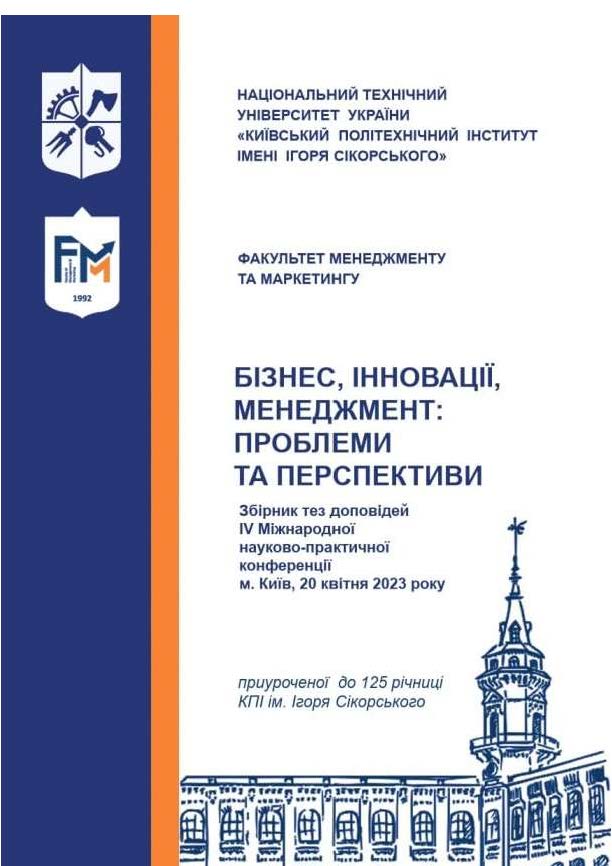PROCESS APPROACH: POSSIBILITIES OF IMPLEMENTING ANTI-CRISIS PRIORITIES OF THE ENTERPRISE
Ключові слова:
ANTI-CRISIS PRIORITIES, system of management science, anti-crisis mechanisms, process-oriented conceptАнотація
The process approach is one of the modern directions in the system of management science, the implementation of which opens up a whole range of possibilities for ensuring the competitiveness of the enterprise regardless of the results of its activities and development trends [1]. The advantages of the
process approach have been confirmed by the management practices of many well-known companies and
state structures [1]. At the same time, the process approach opens up wide opportunities in the direction of anti-crisis management of the enterprise, solving a complex of anti-crisis tasks at various stages of the life cycle of the enterprise, implementing strategic priorities of anti-crisis management.
Anti-crisis management combines three main aspects – management in pre-crisis conditions, management in crisis conditions and management of the exit from the crisis. The toolkit of the process
approach allows you to solve the relevant problems under any conditions of the development of crisis trends, including problems related to the management of the process of exiting the crisis. At the same time, the
philosophy of the process approach, its orientation plays a special role from the point of view of the implementation of tasks precisely in pre-crisis conditions. Diagnostics of business processes and their
grouping make it possible to identify weak links in the management system and make appropriate adjustments in a timely manner. Therefore, the toolkit of anti-crisis management is the most convenient from the point of view of ensuring the anti-crisis orientation of the enterprise management system. Anti-crisis projection of management analysis based on the process approach allows to prevent the development of crisis processes, identify development reserves, increase economic efficiency and sustainability.
The classic model of process-oriented management is a model in which anti-crisis mechanisms are embedded in the system, so the enterprise has significant anti-crisis potential. Building such a management model on a practical level is quite a difficult task associated with a whole set of risks. An enterprise focused
on the implementation of integrated process management mechanisms must reach an appropriate level of development, create appropriate prerequisites, otherwise such attempts may cause significant problems in
the enterprise's development. Management tasks in pre-crisis conditions can be solved through the use of individual tools of the process approach, without creating a complete management system.
Given the changes that are observed in the environment of modern companies – the emergence of new technologies, products, increased competition, rapid transformation of markets, etc. – there is an
objective need to integrate management methods, technologies and tools. The prerequisites for the
transformation of management concepts and methods, the emergence of new management directions are
being formed. The search for mechanisms for combining process and anti-crisis management tools will allow
solving new tasks in new conditions. This approach will ensure the flexibility of the management system, economic resources, the enterprise as a whole, as well as the neutralization of threats that can cause the emergence of crisis situations [2].
The process-oriented concept involves a combination of management tools and IT tools. Mastering
such approaches to enterprise management allows you to integrate other tools, move in the direction of building innovation-oriented systems of management systems, which are characterized by significant
flexibility. Through the tools of process-oriented management, it is possible to ensure significant efficiency of internal and external communications, which is a basic prerequisite for the flexibility of the enterprise and allows to prevent the development of local crises of various nature, which can lead to the emergence of a
financial crisis. In addition, there are opportunities to identify new development reserves and generate positive financial flows. The introduction of innovative management tools into management practice significantly expands the capabilities of anti-crisis management, increases the flexibility of management personnel – an important component of an anti-crisis manager. However, the implementation of such tasks on a practical level requires a significant expansion of the professional competences of enterprise managers, paying significant attention to the development of human resources.
Посилання
Michael Hammer and James Champy. Reengineering the corporation: a manifesto for business revolution.
PerfectBound. 2001. 271 p. 2. Кулиняк І. Я., Жигало І. І., Горбенко Т. М. Кризові ситуації на підприємствах: сутність, класифікація, загрози виникнення та заходи реагування. Інфраструктура ринку. 2021. № 51. С. 175-183.

